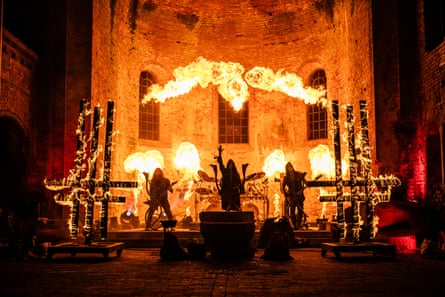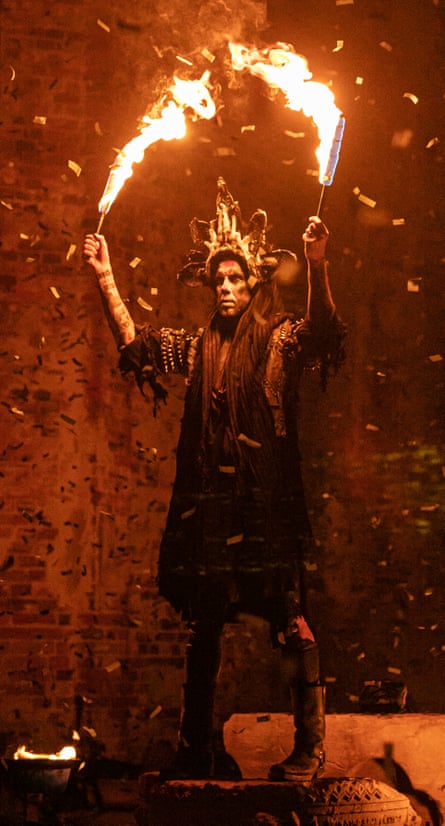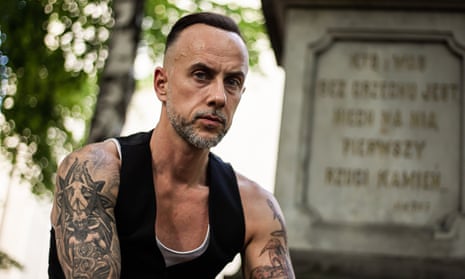Blasphemy rather comes with the territory in the world of extreme metal. Since Venom proclaimed themselves In League With Satan in 1981, antagonising Christianity has been more or less compulsory to any extreme band worth its brimstone, though this has historically tended not to result in anything more than fulmination from a pulpit.
But not in Poland, where last month, Nergal, the leader of the successful quartet Behemoth – whose album The Satanist cracked the US Top 40 in 2014 – was convicted of blasphemy after posting a photo on social media of him treading on an image of the Virgin Mary. He’s appealing, but if the conviction is upheld he faces a fine at least, possible imprisonment, and a criminal record that will make international touring difficult.
“This is my Instagram. This is my realm. And I’m just letting myself be myself within my realm,” Nergal says. “It’s a supposed Virgin Mary painting, because you don’t know if it’s the Virgin Mary, do you? You see the context, but you don’t know. And you see the boot. That’s all you see. It’s not like there are 10 people around me saying, ‘Hey, Nergal, what should we do to bring some attention to you?’ Because I don’t need that attention.”
Indeed, Nergal is no stranger to controversy. While he is critical of Poland’s rightwing administration, he has been accused of being a far-right supporter himself, which he has denied. In 2017, after the Rock am Ring festival was evacuated owing to a terrorist threat, he told an interviewer: “The civilised world is at war with radical Islamists, and that’s a fact.” In 2018 he was pictured with the far-right Polish musician Rob Darken, later saying “I don’t condone Rob’s personal ideals and agenda because I don’t know them”, and was criticised last year for posting an image of a T-shirt with the legend “black metal against Antifa”, later saying: “I’m concerned about damage [Antifa] make to the scene. The ideals are OK, but the execution of them is utterly incompetent.” Even being charged with blasphemy is not a new experience: in 2010, he was charged in relation to an incident in 2007, in which he tore up a Bible on stage (the charges were dropped). And this case, he says, is one of three he is fighting simultaneously; it’s just the one he happens to have been convicted of.
Nergal’s case is one of a rising tide of blasphemy prosecutions in Poland, often targeted at artists. In the past couple of years, with the rightwing Law and Justice party in power, the number of blasphemy prosecutions has doubled: 29 indictments were filed in 2020, against 10 in 2016. They are brought under article 196 of the country’s penal code, which demands prosecution of “whoever offends the religious feelings of other persons by publicly insulting an object of religious worship, or a place designated for public religious ceremonies”.
As Nergal notes, the wording is meaninglessly vague: “In court I am asking, is there a thermometer of religious beliefs? Because if there is, just give me one and I will stick it up my ass and know when I am hitting some limit. But I don’t know where it is, because you are so sensitive and fragile. If they win all these cases, it will make it easy for these people to point at anything and go: ‘You know what? That hurts my religious beliefs.’” Moreover, it doesn’t require widespread offence: just four people complained about Nergal’s Instagram post. “Why are you entering my social media to get offended? They are opportunists, who want to capitalise on my back, because they know I’m an easy target and when they bring me to court they get headlines the next day – I’m their favourite scapegoat.”

It’s easy to write this off as trivial, but blasphemy laws are important, says Jessica Ní Mhainín, policy and campaigns manager at Index on Censorship: “The right to blaspheme, to speak irreverently, or against a prevalent dogma is an essential part of our freedom of expression. Laws that prohibit offending someone else’s religious feelings do not protect freedom of religion, they unduly curtail free speech.”
While many other countries maintain blasphemy laws, only Poland among European nations displays any interest in enforcing them. “Blasphemy laws are completely incompatible with international conventions on freedom of expression, and human rights experts and organisations the world over continue to call for them to be repealed,” Ní Mhainín says. “International law embraces even expression that may be regarded as deeply offensive, including blasphemy.”
Poland’s ministry of justice takes a different view, arguing the European court accepts that freedom of expression may be subject to restrictions and “carries with it obligations and responsibilities which depend on the circumstances and manner of expression,” a spokesperson for the ministry tells the Guardian via email.
On the specific offence of blasphemy, the ministry adds: “Such statements do not enrich the public debate, nor do they lead to the development of tolerance or respect for human dignity, which are the basis of a democratic and pluralist society. The state may therefore deem it necessary to take measures to repress certain forms of expression. This is justified especially in the case of a deliberate violation of the spirit of tolerance, when, for example, the object of religious worship has been deliberately and maliciously presented in a provocative manner.”
Nevertheless, this must be set within a wider context. Mateusz Morawiecki, Poland’s prime minister, has been open about his desire for a “culture war” to defend Catholic values. In December 2017, he told the Catholic broadcaster Radio Maryja: “We want to transform Europe, this is my dream, to re-Christianise it. We want Poland to be strong, but also to contain ... Christian values. We will defend them against the background of laicisation and a deepening consumerism.”
Poland’s blasphemy laws matter because they are part of a wider attack on human rights. A recent blasphemy case saw LGBTQ+ activists charged for giving an image of the Virgin Mary a rainbow halo (they won their case, which Nergal sees as a sign of hope). Law and Justice is committed to fighting LBGTQ+ ideology; and earlier this year the government enforced a near-total abortion ban. Nergal sees all these things as interrelated.

“You can smell that it’s not really about spirituality here; it’s all about a very shallow tradition and political power,” he says. “That’s what Polish Catholicism has always been about. It was just about the tradition; it’s a facade. It’s an elephant on porcelain legs. This case, and the women’s rights, and the LGBT thing, they are all about the violation of human rights on so many levels. And one of the levels is my department.”
The abortion ban was opposed by a majority of Poles, and provoked mass demonstrations earlier this year. The arrest of the LGBTQ+ activist Margot last year also led to protests, which saw 48 people arrested in what has become nicknamed “Poland’s Stonewall”. Nergal, though, has to stand alone: extreme metal singers tend to scare people off. One Polish music star who has been vocal about abortion and LGBTQ+ rights refused to comment for this piece, saying: “The main topic and the main character of the article is really controversial.”
The Polish Catholic church is facing deep problems. There have been repeated scandals involving child abuse by priests, and subsequent cover-ups. There have been enough people leaving the church that the Institute for Catholic Church Statistics has announced an investigation into the departures. Fascinatingly, Google searches for “apostasy” are at an all-time high in Poland.
All of which gives Nergal hope. “It is amazing to see that Catholic society being disoriented: ‘What the fuck?’ It will eventually put the church where it belongs – it should be like the Czech Republic, where if you want it you go and practise your stuff. But that’s where you belong – don’t enter my life with your dirty boots, because I’ve never asked you to do so.”
It would be easy to paint this as a generational divide: just 9% of young Poles now take a positive view of the Catholic church. However, it’s not quite so simple, Nergal warns. “I would like to think that’s the case, but then we have the dangerous growth of rightwing sympathisers. A lot of them call themselves patriots, and they mix up all these dangerous philosophies that are nationalistic and xenophobic, anti-this and anti-that, anti-LGBT, no foreigners.”
Nergal is now taking the fight to his opponents. He has launched a crowdfunder to raise money for his defence, and any surplus will go towards the social justice campaigns kicking back against the state’s imposition of hardline Catholic values. “I am part of that anti-government tide, that massive wave of people saying: ‘Fuck no. You’re not going to make us slaves to your agenda. You’re not going to make it a Catholic state.’ We are talking about a bigger thing than a musician facing a legal problem: if you want to evolve as a country, you must go secular.”
